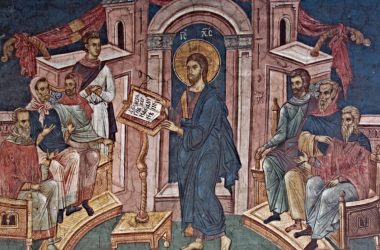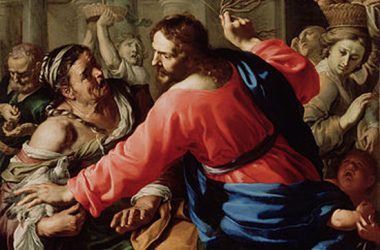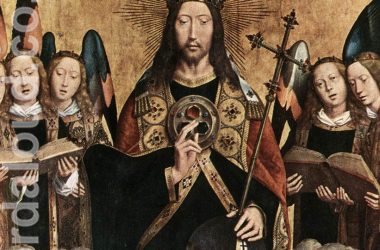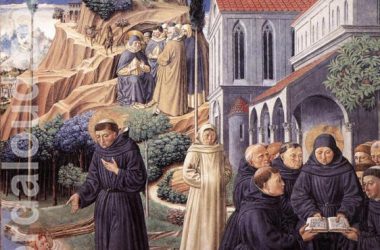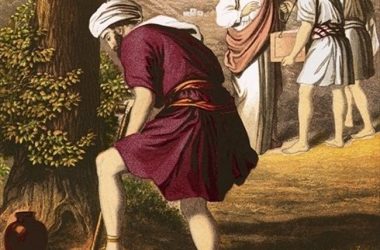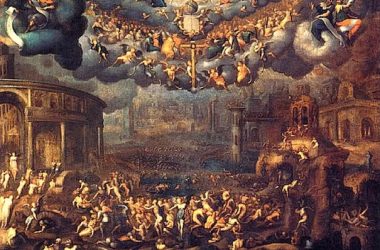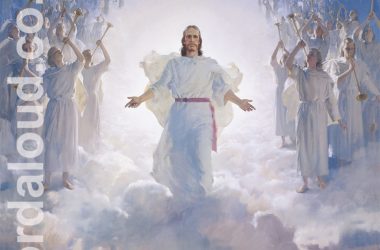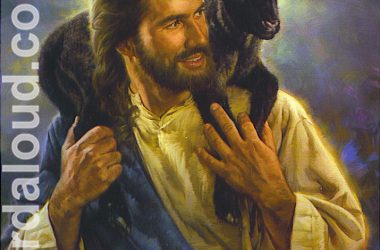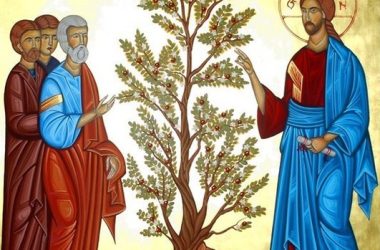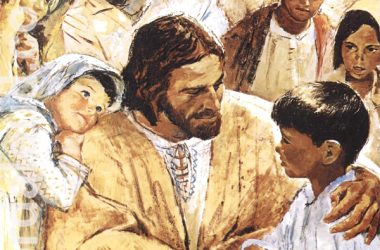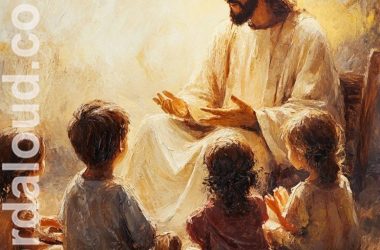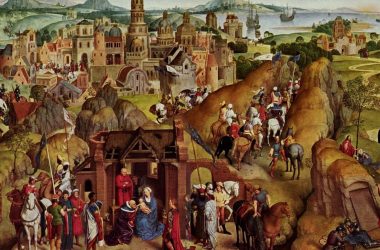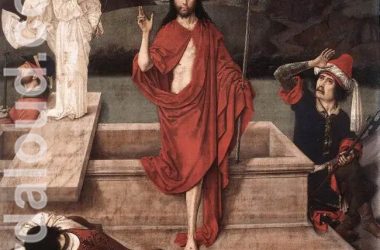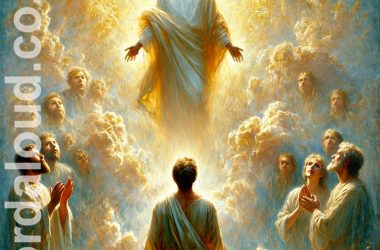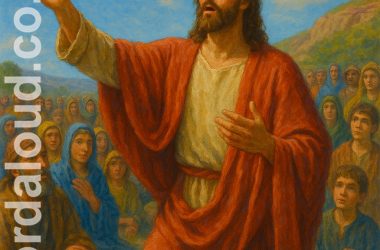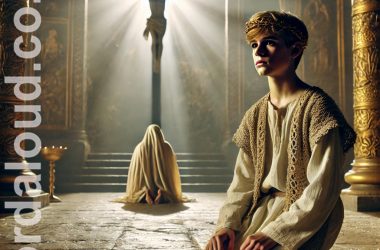Saint Cyril of Alexandria considers how the Holy Spirit is given to humanity through Christ. Saint Cyril’s central point is that the renewal of human nature is inseparable from the gift of the Spirit. Without the Spirit, humanity cannot return to the peace and stability intended by God from the beginning.[ … ]
Jesus | Christian Prayer | Reflections On The Gospels
Prayer with Jesus Christ
We live in Christian community | Pray with Jesus
The Temple | Jerusalem | Judaism | Jesus | First / Second Temple Judaism | Solomon | Herod | Destruction Of The Temple | The Psalms Celebrate And Long For The Temple | The House Of God
Second Temple Judaism refers to the religious and cultural practices of the Jewish people during the Second Temple period, which lasted from the construction of the Second Temple in Jerusalem in 516 BCE until its destruction by the Romans in 70 CE. During this time, Judaism was marked by the development of various religious movements and the emergence of important religious figures such as the Pharisees, Sadducees, and Essenes [ … ]
Daily Bible Verses For Advent | Christ’s Reproach To This Generation | Children In The Marketplace | Kingdom Of Heaven | Kingdom Of God
The image of children in these Bible verses is curious. We could read the lines as suggesting childishness, with one group of children expecting to amuse another and reacting peevishly when those others do not move according to the music they play. We could more broadly read these verses as suggesting a disconnect between various children, a failure of communication, recognition, response, which is emblematic of Christ and his followers and those who reject him …
Daily Bible Verses For Advent | John The Baptist | The Kingdom Of Heaven | King James Audio Bible KJV
In today’s verses, Jesus pays tribute to John the Baptist, telling the crowds that John the Baptist, until the dawn of the New Testament, the arrival of the Kingdom of God, was the greatest of people. John the Baptist was a courageous, inspirational figure and had the honour of proclaiming Christ’s presence, then he looked on satisfied as his disciples went from him to follow Christ: ‘He must increase, but I must decrease.’
Meditations On The Love Of Jesus Christ On The Via Dolorosa | Stations Of The Cross | Christian Prayer
O Lord, as I begin this journey through the Stations of the Cross, I ask you to be with me and guide me. Help me to open my heart to your love and to be present to your presence in each moment. May this time of meditation deepen my understanding of your sacrifice and strengthen my faith in your redeeming power. I ask this in your holy name. Amen [ … ]
Daily Bible For Advent | Parables Of Jesus Recalled | The Lost Sheep | Children In Christian Faith | Jesus And A Child
In these verses of the Bible, Christ expresses the love of God for all people. Christ’s is not an exclusive calling, nor especially a calling to those who most clearly, visibly, seem to adhere to the requirements of the Old Law; he has come to bring home to God those who have wandered, sinners who have fallen far from the Law. When a sinner comes home to God, there is incredible rejoicing in heaven. So we, though we may sin, should never be afraid to return to the Church, to say sorry, confess our sins, and find forgiveness [ … ]
Daily Bible For Advent | Jesus’ Prayer And Healing | The Sermon On The Mount Concludes | Sin And Faith | The House Built On A Rock
Matthew’s account of the Sermon on the Mount has been related through the whole of chapters five, six and seven of his Gospel. Jesus concludes his teachings with today’s Bible verses, which carry both a promise and a warning. Commencing with the Beatitudes, Jesus’ Sermon on the Mount has presented to the people, toward the start of his ministry, a most beautiful, transformative understanding of God’s call to us to be with Him and to live according to the real, inner truth of the law [ … ]
Daily Bible Verses | The Lesson Of The Fig Tree | Kingdom Of Heaven | Kingdom Of God | Jesus Christ Is Coming Soon
Just as Jesus’ listeners know how to interpret signs in nature, the trees beginning to bud and shoot new leaves as they come to life in spring, so Jesus tells them that, when they see and experience the upheavals described by Jesus in our Gospel verses of the past few days, they will know that the Kingdom of God is near [ … ]
Daily Bible Verses | Great Tribulation In Jerusalem | Son Of Man | Apocalypse | Kingdom Of God | Jesus Christ Is Near | Parousia
The Christians living in Jerusalem wanted no part of the Jewish Rebellion and, remembering Jesus’ prophecy, fled Jerusalem as the Romans advanced. They avoided the slaughter, and for this there arose enmity between Christians and those Jews who adhered to the old Law. There was a parting of the ways. The Jews went to rebuild their religion, led by the Pharisees and along exclusive lines, never more to be centred on Temple worship. The Jewish Christian Church which had been in Jerusalem waned – the Temple had been of great importance to Jerusalem Christians also. Henceforth, the Church would become more and more of the Gentiles [ … ]
Daily Bible Verses | Persecutions Of Christians | Martyrs For Jesus In The Garden Of Gethsemane | King James Audio Bible | KJV
Jesus teaches us to be bold and to have faith and confidence in the light of persecutions. His listeners are told that, when they are accused, the Spirit will be with them, guiding their words such that they become a living testimony to Jesus. The Christians’ accusers will be unable to answer their words then – the force of their witness will be irresistible [ … ]
Daily Bible Verses | The Eschatological Discourse | Destruction Of The Temple | Kingdom Of Heaven | Kingdom Of God
In Luke’s account of the eschatological discourse, the apocalypse – from the Greek for revelation – is clearly envisaged as beginning in the destruction of Jerusalem and the Temple in AD 70. The natural world is portrayed as being in a state of turmoil, and this reinforces for the listener the impact of what will be – has been by the time of Luke’s writing – a political event. The Jewish rebellion and the sacking of Jerusalem will be brutal and bloody [ … ]
Office Of Readings | Week 34, Sunday, Ordinary Time | Christ The King | A Reading From The Book Of Origen On Prayer | Thy Kingdom Come
Origen reflects on the petition ‘Thy kingdom come’ as a request not for an external spectacle but for an interior reality. He begins with Christ’s teaching that the kingdom does not arrive with visible signs, for it is ‘within us and in our hearts’. With this, Origen redirects attention away from expectation of outward change and towards the inner life in which God’s reign is established through grace. The prayer for the kingdom is therefore a prayer for transformation: that God’s life may take root, grow, and reach its intended fullness within the believer [ … ]
Office Of Readings | Week 33, Friday, Ordinary Time | A Reading From The Treatise Of Saint John Eudes On The Kingdom Of Jesus | The Mystery Of Christ In Us And In The Church
Saint John Eudes reminds us that Christ’s mysteries are not only past events but living realities meant to take shape within us. Everything that Jesus lived on earth—his birth, his hidden life, his suffering, his rising, his glory—he desires to live again in his members. The Christian life, then, is not merely imitation from a distance; it is Jesus Christ quietly forming his own life in us, day by day [ … ]
Parable Of The Pounds (Talents) | Parables Of Jesus | Kingdom Of Heaven | Kingdom Of God
Jesus’ listeners continue to think that Jesus is journeying to Jerusalem there to inaugurate an earthly, political Kingdom of God, to expel the Roman power and restore an only ever briefly realized independent nation state in the Promised Land. Jesus speaks this parable, which is similar to the parable of the talents, in order to teach his disciples that they are not very soon to see an instant transformation in the world and that they have a lot of work to do. Their calling is not to be to lord it over others; it is to serve and do the utmost with the gifts they have received through walking with Jesus, to magnify the faith and preach the Gospel to the whole world [ … ]
Daily Bible Verses | The Day Of Christ’s Coming | King James Audio Bible KJV | Apocalypse | Love Revealed By Jesus Christ
Jesus continues to speak to his listeners about the apocalyptic coming of the Son of Man. Using a highly elevated, figurative language, laden with symbol and metaphor, Jesus describes the second coming, or Parousia, which marks the end of this period of history and the inauguration of the new age, the days of the Son of man; it is a scene of sudden, violent destruction and transformation, and a scene of judgement [ … ]
Daily Bible Verses | The Coming Of The Kingdom of God | King James Audio Bible | Love Revealed By Jesus Christ
The Kingdom of God has come in the person of Jesus. This is Jesus’ message, and it is this that will lead to his being crucified. It is this toward which the language of apocalypse directs us: our old way of being fractures with the coming of Jesus; the new reality of which we are a part is as lightning flashing across the sky – across the whole sky, the whole of our world, from one side to the other. And still we are told there is to be no visible sign of the coming of the Kingdom. It is within us, in the midst of us, when we walk as disciples with Jesus [ … ]
Daily Bible Verses | Faith As A Grain Of Mustard Seed | Forgiving Offences | King James Audio Bible KJV | Parables
To cause scandal is to drive other people away from the path of faith, to cause another person to sin, to withdraw from a life of grace, to cease to believe in redemption in Jesus Christ. This is a terrible sin, and we know that it does not stop there. The evil spreads, and soon it is common practice to denigrate Christianity. We think of the millions upon millions of little ones – and this in ‘Christian countries’ – who have never been introduced to Jesus, and of all the attendant troubles they experience because their spiritual lives have not been fostered. The signs of this spiritual neglect are endemic, while when many people speak against Christianity they do not even know what it is that they are objecting to; they have become in so little time so far removed from what could have been their inheritance, the living faith [ … ]
Parables Of God’s Mercy | The Lost Sheep And The Lost Coin | King James Audio Bible KJV | Parables Of Jesus
The publicans (tax collectors) and other sinners are drawn to hear Jesus’ teaching. Perhaps they feel Jesus offers hope to them especially. While the scribes and Pharisees, despising sinners, find Jesus behaviour as he mixes with such people to be utterly objectionable, Jesus receives all humanity with love, understanding and, where there is faith and repentance, forgiveness. It is as if the people know that they are not condemned but can be accepted by Jesus. He offers them hope [ … ]
Parable Of The Invited Guests | What Do Jesus’ Parables Mean? | Audio KJV | Vocation | Kingdom Of Heaven | Prayer
The Jews of Christ’s time thought of the coming of the Messiah and the restoration of Israel in terms of a great banquet, where poverty would give way to plenty and conflict to fellowship. Jesus has told two parables, while he dines at the house of the leader of the Pharisees, one of the choice of places at a feast and one of inviting the sick and the poor. In the light of the parables, a guest at the meal is moved to express the hope of the coming of the Messiah [ … ]
Daily Bible Verses | O Jerusalem, Jerusalem | Herod Threatens Jesus | King James Audio Bible KJV | Kingdom Of God
Some few of the Pharisees now show solidarity with Jesus, warning him that Herod Antipas means to kill him. Herod has previously expressed a wish to meet Jesus (Luke 9: 9), about whom he was perplexed, wondering if John the Baptist had risen again. We do not know whether the Pharisees simply want to get Jesus to go away or if there is danger [ … ]
Daily Bible Verses | The Narrow Gate | Christ’s Judgement | King James Audio Bible KJV | Love Revealed By Jesus
Christ’s journey from Galilee to Jerusalem is an ascent, literally, that occupies the central third of Luke’s Gospel. When the journey begins, it is made explicit that this is a journey toward the cross: ‘And it came to pass, when the time was come that he should be received up, he stedfastly set his face to go to Jerusalem…’ (Luke 9: 51) Christ’s teachings as he and his disciples travel are cued to the sense of steady, deliberate movement toward the Passion [ … ]
Parables Of The Mustard Seed And Of The Leaven | King James Audio Bible KJV | Love Revealed By Jesus Christ
The two parables make it clear that Christ intended the newly inaugurated phase of the history of our salvation to be the work of ages. His second coming was not to be an apocalyptic end of the world as we know it in weeks, months or just a few years after that first Easter. The world’s faith would grow with time. Christ’s Church would grow, to encompass the whole world. Christ intended the Gospel be preached to everyone the world over and through all subsequent history [ … ]
Office Of Readings | Week 29, Wednesday, Ordinary Time | A Reading From The Letter Of Saint Augustine To Proba | You Will Find Everything In The Lord’s Prayer
Saint Augustine brings his reflection on prayer to its culmination by turning to the Lord’s Prayer — the model and measure of all Christian supplication. For him, this brief prayer given by Christ contains the fullness of all holy desire. Every petition found in Scripture, every movement of the soul toward God, finds its echo and completion within its sevenfold structure [ … ]
Office Of Readings | Week 29, Tuesday, Ordinary Time | A Reading From The Letter Of Saint Augustine To Proba | On The Lord’s Prayer
In his exposition of the Lord’s Prayer, Saint Augustine presents not a set of verbal formulas but the structure of Christian desire. The prayer given by Christ is, for Saint Augustine, a complete guide to the orientation of the soul. It teaches not what God needs to hear, but what humanity needs to learn to desire rightly. To pray well is to have the heart corrected and enlarged, so that its longings accord with divine wisdom [ … ]
Office Of Readings | Week 28, Friday, Ordinary Time | A Reading From The Book Of Saint Augustine The City Of God | In Every Place There Is A Sacrifice And A Clean Oblation Offered To My Name
In The City Of God, Saint Augustine defines the nature of true sacrifice and its relation to union with God. He distinguishes outward ritual from inward intention: a sacrifice is not simply an act performed, but a work directed to God as its final end. Its purpose is communion with the divine and the attainment of true happiness, which consists in clinging to God [ … ]
Office Of Readings | Week 28, Wednesday, Ordinary Time | A Reading From The Discourses Of Saint Maximus The Confessor Addressed To Thalassius | The Light That Enlightens Every Man
Saint Maximus the Confessor interprets Christ’s saying about the lamp set upon a lamp stand (Matthew 5:15; Luke 8:16) as a theological statement about the Incarnation and the Church. The ‘lamp’ is Christ himself — the eternal Word of the Father, who has taken human nature and become visible within creation. The imagery unites revelation and embodiment: divine wisdom, formerly hidden, is now manifest through the humanity of Jesus [ … ]
Daily Bible Verses | Mission Of The Twelve Apostles | King James Audio Bible KJV | Preach The Gospel
Jesus has amazed the people with his teaching and with his signs and healing miracles. Now Jesus entrusts and enables the Twelve to go out and to do the same. In calling the Twelve, Jesus intensifies the announcement of the good news. Here is a further stage by which Jesus founds his Church, sending his disciples out on mission and giving them power [ … ]
Parable Of The Unjust Steward | Parables Of Jesus | King James Audio Bible KJV | Love Revealed By Jesus Christ
Today’s parable may seem to us to be very strange. Fired for corruption, for being wasteful with the rich man’s property, the dishonest steward goes on to compound the error with outright criminality, marking down the debts of the rich man’s debtors in order to secure future favours. And Jesus praises him! [ … ]
Daily Bible Verses | Miraculous Catch Of Fish And The Calling Of The First Disciples | Fishers Of Men | King James Audio Bible KJV
Luke’s Gospel places the calling of the first disciples after the fame of Jesus has already spread across the region. Simon Peter listens to Jesus’ words, then he experiences the miraculous catch of fish, and then he throws himself down before Jesus, acknowledging his sins and placing his life in Jesus’ hands. This is Simon Peter’s call. He gives away everything he has to follow Jesus [ … ]
King James Audio Bible | KJV | A Way Of Poverty? | Jesus And The Rich Young Man | King James Version | Gospels | Psalms
The passage, Matthew 19:16-22, recounts the encounter between Jesus and a wealthy young man who asked Jesus what he must do to inherit eternal life. In response, Jesus told him to keep the commandments, to which the young man replied that he had done so since his youth. Jesus then told him to sell all his possessions, give the money to the poor, and follow him. The young man went away sorrowful because he had great possessions, which he finds himself unable to relinquish [ … ]
Office Of Readings | Week 16, Thursday, Ordinary Time | A Reading From The Discourses Of Saint Ambrose On The Psalms | Light Of God’s Countenance
Saint Ambrose’s reflection on Psalm 44 (/Vg. 43) considers what might be one of the most persistent experiences in spiritual life: the feeling that God has turned away. Rather than offer abstract consolation, Saint Ambrose interprets this experience through the lens of faith, Scripture, and theology. His aim is to show that even when God seems absent, he remains present in a real and transformative way [ … ]
Daily Bible Verses | Discourse Of The Mission | I Came Not To Send Peace, But A Sword | King James Audio Bible
In today’s Gospel reading, Jesus’ message may strike us as difficult to understand. Throughout the Gospels, Jesus’ message is one of peace and Christian brotherhood, of reconciliation with our fellow human beings and with God, whom we are asked to call Father. Today Jesus speaks of variance and contradiction. Jesus tells us that he has not come to bring peace, but a sword [ … ]
Daily Bible Verses | Christian Mission | Jesus Instructs His Disciples | Faith And Christian Prayer | King James Audio Bible
No matter how great the world’s lies may be, we are assured by Jesus, truth will triumph. For this reason, these verses of the Gospel of Matthew teach us, we need not be afraid, though the going can get very rough indeed, and our Christian faith will be tested, our love always coerced to turn into the opposite of love, and so we need always the more love to counter this threat [ … ]
Daily Bible Verses | Speak The Name Of Jesus | The Mission | Jesus Reassures The Apostles | Challenges To Come
‘I speak the name of Jesus.’ As the Discourse of the Mission continues, Jesus prepares his disciples to face danger. They are to be as sheep. In this way again they are to imitate Jesus – to act in persona of Jesus – as they preach and heal, as they prefigure the saving sacrifice upon the cross. There is to be contention, contradiction [ … ]
Daily Bible Verses | The Discourse Of The Mission | Jesus Instructs His Disciples | Power Of Exorcism | Trust In God
The Discourse of the Mission continues as Jesus mandates his disciples to preach the good news that the Kingdom of heaven is at hand. This is a wonderful, new message. For other Jews, the Kingdom to come remained far in the future. It would come after they had done their own part. The Pharisees believed that the Kingdom would come once the Law were perfectly observed, the Essenes when the country would have purified itself. For Jesus, the time is already fulfilled. Independently of any good works the people could do, the Kingdom of God is here already, as a completely gratuitous gift of God. What is now required is to teach the people to perceive this fact. This will mean to look at the world in a new way [ … ]
Daily Bible Verses | Discourse Of The Mission | Power Of Exorcism | Our Neighbours | The Apostles Are Sent
Jesus’ great Discourse of the Mission begins in these Gospel verses with the calling together of the twelve disciples and the summative naming of the twelve. These twelve apostles are mandated; they are sent to establish the first foundations of Christ’s Church, and they are empowered by Jesus to exorcise unclean spirits and to heal the sick, to perform the very miracles of Jesus as a sign that the Kingdom of God has come. Through exorcism, the apostles are called to an imitation of Christ, and so in this way to establish the Christian community [ … ]
Office Of Readings | Week 12, Monday, Ordinary Time | A Reading From The Treatise Of Saint Gregory Of Nyssa On Christian Perfection | The Christian Is Another Jesus Christ
Saint Gregory, one of the Cappadocian Fathers and a central figure in fourth-century theology, explores what it means to bear the name ‘Christian’. Drawing heavily from the writings of Saint Paul, he lays out a vision of spiritual transformation in which the believer becomes an ‘alter Christus’ – another Christ [ … ]
Office Of Readings | Week 11, Tuesday, Ordinary Time | A Reading From The Treatise Of Saint Cyprian On The Lord’s Prayer | Hallowed Be Thy Name
Saint Cyprian of Carthage, writing in the 3rd century during times of persecution and doctrinal unrest, offers a spiritually profound and pastorally sensitive reflection on the opening petitions of the Lord’s Prayer. His meditation on ‘Hallowed be thy name’ invites us to reflect not only on what we say in prayer, but how we live as those who call God ‘Father’ [ … ]



